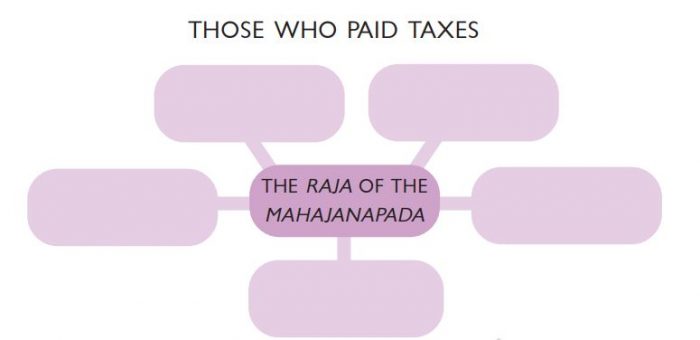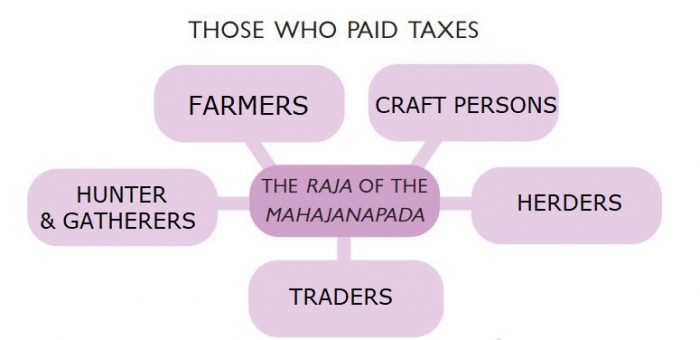Let’s Recall
Question 1 State whether true or false:
(a) Rajas who let the ashvamedha horse pass through their lands were invited to the sacrifice.
(b) The charioteer sprinkled sacred water on the king.
(c) Archaeologists have found palaces in the settlements of the janapadas.
(d) Pots to store grain were made out of Painted Grey Ware.
(e) Many cities in mahajanapadas were fortified.
Answer (a) Rajas who let the ashvamedha horse pass through their lands were invited to the sacrifice – True
(b) The charioteer sprinkled sacred water on the king – False
(c) Archaeologists have found palaces in the settlements of the janapadas – False
(d) Pots to store grain were made out of Painted Grey Ware – False
(e) Many cities in mahajanapadas were fortified – True
Question 2 Fill in the chart given below with the terms: hunter-gatherers, farmers, traders, crafts persons, herders.
Answer
Hunter gatherers, farmers, traders, crafts-persons and herders-all paid taxes.
(i) Farmers – one sixth of the produce.
(ii) Crafts persons – in the form of labour.
(iii) Herders – in the form of animals and animals produce.
(iv) Traders – taxes on goods brought and sold.
(v) Hunter and gatherers – forest produce.
Question 3 Who were the groups who could not participate in the assemblies of the ganas ?
Answer These groups of people were not allowed to participate in the assemblies of the ‘ganas’.
- Women
- Shudras
- Kammakaras
Let’s Discuss
Question 4 Why did the rajas of mahajanapadas build forts?
Answer The rajas of mahajanapadas built forts to protect their capital city, to show how rich and powerful they were by building really large, tall and impressive walls around their cities and fortified cities was easy to manage.
Question 5 In what ways are present-day elections different from the ways in which rulers were chosen in janapadas?
Answer
(1) Present day elections are conducted by election commission. In janapadas we did not have election commission. Some of the rajas were probably chosen by the jana, the people. But around 3,000 years ago, we find some changes taking place in the ways in which rajas were chosen. Some men now became recognised as rajas by performing very big sacrifices.
(2) In present-day elections, all citizens (including women and dasas etc.) participate in election process after 18 years of their age. But in janapadas all free men over the age of 30 were recognized as full citizens. In janapadas women and slaves were not considered equal free citizens.
(3) Appointments for rulers were made through lottery. All those who wanted to be chosen gave in their names and then some were selected through lottery.
Let’s Do
Question 6 Were there any janapadas in your state? If yes, name them. If not, name the janapadas that would have been the closest to your state, and mention whether they were to the east, west, north or south.
Answer The answer depends on the region you live in. The ‘janapadas’ in the present day Uttar Pradesh are Panchala, Kosala.
Question 7 Find out whether any of the groups mentioned in answer 2 pay taxes today.
Answer Traders and Craftsperson
Question 8 Find out whether the groups mentioned in answer 3 have voting rights at present.
Answer Yes, all the groups mentioned in answer 3 have voting rights at present.


Leave a Reply